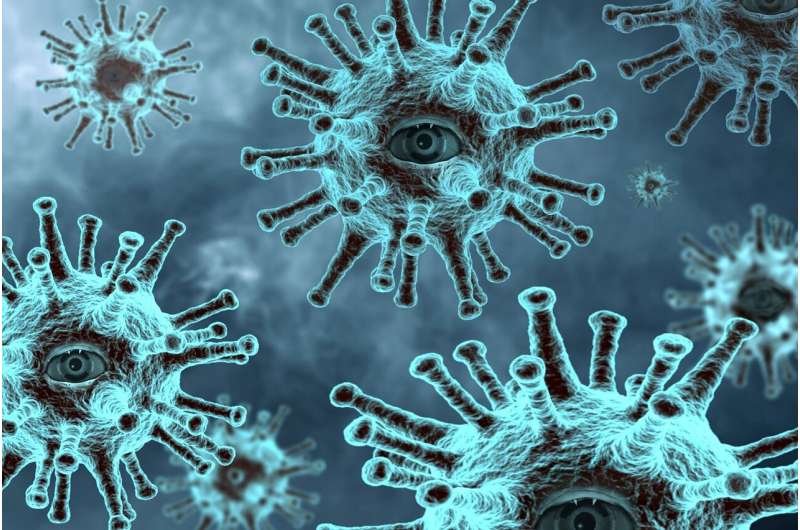Hospitals must help their own COVID-19 long-haulers recover, experts argue

By mid-November, the Centers for Disease Control and Prevention had reported that 218,439 health care workers in the U.S. had been infected with COVID-19—a likely underestimate due to incomplete data from states. About 3% to 4% of health care personnel who recover from coronavirus infection are expected to become "COVID-19 long-haulers" as they cope with debilitating symptoms 12 to 18 months after the acute stage of the infection clears.
"As COVID-19 surges again, hospitals are facing a shortage of skilled frontline providers who can meet the relentless demands of caring for these patients," says Zeina N. Chemali, MD, MPH, a psychiatrist and neurologist at Massachusetts General Hospital (MGH) and senior author of an article in Lancet Respiratory Medicine on the challenges of health care workers who are COVID-19 long-haulers. "Providers struggling with post-COVID-19 complications will further strain the health care system unless medical institutions step up to support those who have sacrificed their health during the pandemic." Chemali directs MGH's McCance Center for Brain Health and the neuropsychiatry clinic, which treat COVID-19 survivors with lingering symptoms.
Long-term complications of COVID-19 can affect multiple organs in the body. Some people suffer neuropsychiatric complaints, such as overwhelming fatigue, brain fog, persistent headaches, altered sleep, anxiety, post-traumatic stress disorder and difficulty concentrating. They may also have cardiopulmonary symptoms—fatigue after exertion, shortness of breath, persistent cough, heart arrhythmias, fluctuating blood pressure and fainting. Currently there are no curative treatments for post-COVID-19 syndromes; therapy focuses on alleviating symptoms and coping strategies. Long-term complications of COVID-19 can occur even in mild cases of the virus.
Chemali and her colleagues are calling for medical institutions to support and promote the safe return to work for all health care workers disabled from lingering symptoms of COVID-19. Current national return-to-work guidelines focus primarily on health care workers' infection status, leaving institutions to establish their own policies or for employees to opt for medical or disability leave. While some institutions have made accommodations for health care personnel as they return to work post-COVID-19, the measures may not apply to all affected workers, exacerbating existing social inequities. In addition, the culture of medicine elevates duty to patients over personal needs, leaving behind the wellness of its workforce.
The authors recommend that multidisciplinary teams at medical institutions be charged with devising back-to-work strategies for health care workers with long-term COVID-19 symptoms. These strategies might include a gradual reintroduction into the work force, limiting shifts so natural circadian rhythms aren't disrupted, mandating frequent breaks and reducing workloads to prevent fatigue, and partnering with other providers to provide oversight during complex tasks and to share clinical responsibilities.
In addition, the authors are advocating for Congress to acknowledge the health issues and needs of long-hauler health care providers and for the new Biden administration to create funding to support health care workers as they recover from COVID-19. Previous U.S. government initiatives, such as the Coronavirus Aid, Relief, and Economic Security (CARES) Act, provided financial support to medical practices and hospitals struggling during the pandemic, but essential hospital workers disabled by the virus didn't individually benefit from the funding, says Chemali.
Medical institutions and society have a moral obligation to support health care veterans of the COVID-19 war, says Chemali, who studies mental health and neurological disorders among refugees and in people living in war zones. "Whether frontline providers are taking care of people in war zones or in hospitals filled with patients with COVID-19, they are working in dangerous, very uncertain and stressful environments," says Chemali. "And yet they continue to perform their mission despite being overworked and burned out, which decreases their resilience and perhaps their immunity to the virus itself. We need to do better by health care workers who get sick with COVID-19. If we don't help survivors of COVID-19 recover and return to work as providers, institutions risk losing even more of their skilled personnel, who will succumb to the exhaustion and stress caused by this relentless COVID-19 tsunami."
More information: Nathan Praschan et al. Implications of COVID-19 sequelae for health-care personnel. The Lancet Respiratory Medicine. Published:January 11, 2021 DOI:doi.org/10.1016/S2213-2600(20)30575-0


















